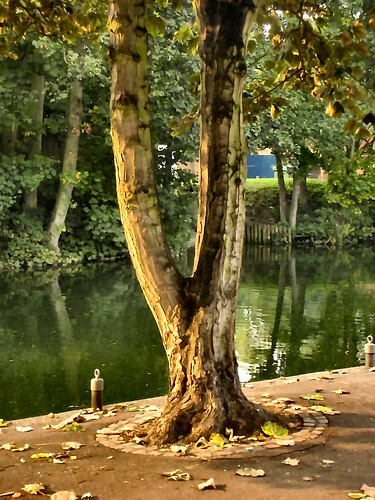
Between lifting my camera and taking the photograph, it became Autumn., originally uploaded by Colonel Blink.
It all started because we have had a spell of warm sunny weather. Despite the presence of mist clinging like Ivy to the trees first thing in the morning, this September has seen the best prolonged spells of good weather this year. Thinking of this I was suddenly struck by the fact that I did not know the derivation of the word Indian Summer. I dived for Brewer's Dictionary Of Phrase & Fable which explained it thus.
Indian Summer. A term of American origin generally applied to a period of fine sunny weather in late autumn. In America it is applied to such a period of mild dry weather usually accompanied by a haze. The name arose from the fact that such weather was more pronounced in the lands formerly occupied by the Indians than in the eastern regions inhabited by the white populace.
Leaving aside the political in-correctness of some of the terms used in a book published as late 1985 I beg to differ with the compiler. In the UK the term Indian Summer has always been applied, in my hearing at least, to any dry sunny period of longer than six days that should occur after the end of the first-class cricket season. Late Autumn has nothing to do with it;The trees just have to start turning brown and someone in the post office or the pub or the supermarket queue will say oh this is a lovely Indian Summer we are having. In point of fact like Christmas, Indian summers are starting earlier and earlier and I confidently expect I will hear someone refer to the few hours of wet wan sun that sometimes appears as a break to the endless August rain as an Indian Summer.
In fact Brewer's adds one more thing to its definition. The words Cp. ST MARTIN'S SUMMER. Turning the pages I come across
St Martin's Summer. A late spell of fine weather. St Martin's day is 11 November.
Presumably St Martin's Day (and his summer) is largely forgotten these days because his day is also what used to be called Armistice Day and now titled Remembrance Day. Which is a pity because he is a fairly useful sort of chap being the patron saint of Innkeepers and reformed drunks.
Looking up things is addictive and I immediately looked up other peoples patron saints. Taxi drivers and cabbies have Saint Fiacre who is also the patron saint of gardeners but he is on a job-share scheme with the last as gardeners also have the Saints Dorothea, Adelard, Tryphon and Phocas to help them dig and delve. Saint Fiacre was a 7th century Irish hermit who settled in France and built a monestry at Breuil. His feast day is August 30th. It is not recorded whether he spent two years riding around London on a moped trying to gain the knowledge and thus become a London cabbie.
Innkeepers don't just have St Martin they also have St Amand who is also the patron saint of Wine Merchants.
Engineers have St Ferdinand III, Dentists have Saint Apollonia (was that a halo he had or a ring of confidence?) while Medical Dieticians have St Martha and Airmen are covered by Our Lady of Loreto with help from Saints Therese of Lisieux and Joseph Cupertino.
I was brought up in the low Anglican tradition and saints did not really get a look in as they were considered a bit Roman and thus a bit infra dig. but as far as I can make out one of their jobs is to intercede on behalf of those who pray to them. St Sebastian is the patron saint of athletes, pin-makers and archers. Making him the patron saint of the last two seems a bit of a cruel joke as he met his death by being bound to a tree and shot at with arrows and finally beaten to death. "As the arrows stuck in his body as pins in a pin cushion, he was also made the patron saint of pin-makers." It seems a lot to ask a chap who has been put to death in such a grisly way to become the patron saint of archer's and intercede on their behalf whenever they pray that they will hit the bulls-eye or gold or whatever the circle in the middle of the target is called. That it is believed that he will intercede shows a lot of Christian forgiveness which is why, I guess, he was made a saint.

No comments:
Post a Comment